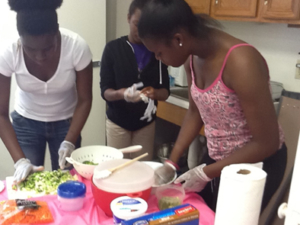
The Expanded Food and Nutrition Education Program (EFNEP) funded by the United States Department of Agriculture (USDA), National Institute of Food and Agriculture (NIFA) is currently implemented by Prairie View A&M University – Cooperative Extension Program in Fort Bend, Harris and Starr counties. EFNEP focuses on working with very limited resource families with children in the household to address serious health disparities such as hunger, malnutrition, poverty, poor health and obesity. EFNEP provides hands-on nutritional education that enables families to adopt and improve their diets and food-related behaviors.
Goal: To teach families the knowledge, skills, attitudes, and behaviors necessary to have nutritionally sound diets, improve the total family diet and nutritional well-being.
Program Implementation: Nutrition Education Associates (NEA’S) provide direct face-to-face nutrition education to families and youth enrolling in classes in a variety of settings in rural and urban communities. Program participants attend a minimum of 6 nutrition education classes. A variety of activities including games, food demonstrations, and physical fitness activities are used to enhance learning opportunities. All program participants are asked to complete a pre/ post-Adult Food and Nutrition-Physical Activity Behavior Questionnaire and 24-Hour Food Recall. EFNEP focuses on food-related practices to help program participants achieve personal and family wellness. The core program areas include diet quality and physical activity, food resource management, food safety and food security.

Program Successes: Five hundred fifty-five adults enrolled in EFNEP classes (impacting 1645 other family members) with a 91% graduation rate. One hundred percent of all graduates completed the 24-Hour Food Recall. Two thousand, five hundred and ninety-four youth enrolled in EFNEP with 62% in grades 3 through 5.
Outcome data from pre/post test indicated: 97% of adult program participants showed positive change in consumption in any food group; 73% began to plan family meals; 91% (465 of 511) showed improvements in one or more food resource management practices (i.e. plan meals, compare prices, use grocery list or did not run out of food), 86% (442 of 511) showed improvements in two or more nutrition practices (i.e. plans meals, makes healthy food choices, prepares food without adding salt, reads nutrition labels or has children eat breakfast), 76% (389 of 510) participants showed improvements in one or more food safety practices (i.e. thawing and storing foods correctly), and 48% (247 of 510) participants showed improvement in both food safety practices (i.e. thawing and storing foods correctly.
Innovation: In an effort to improve high school student interest and participation in the nutrition classes presented at Dobie High School, Vida Harrison (NEA) developed an online participatory game. Using the application (Kahoot) and skills learned during the State Extension Conference, Harrison developed a series of 15 questions on the subject of “Good Nutrition during Pregnancy”. During the class, students used mobile devices to respond to a nutrition quiz and participate in the discussion. The activity was very well accepted by students and their teachers, it also improved positive participation from students.

Vida Harrison
Nutrition Education Associate, Harris County (EFNEP)
(713) 440-4900
VBHarrison@ag.tamu.edu
